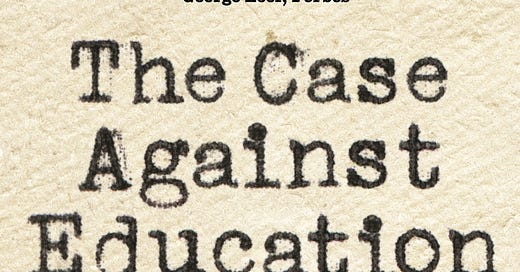On Astral Codex Ten, Scott has written a brilliant piece on why schooling doesn’t work.
As usual, he strides into a field that other smart people have written whole books about, and distills their work into something you can read in five minutes, and adds in new insights beside:
I’m working on my thoughts to it; I hope to post soon. In the meantime, if you’d like to post your thoughts & questions, go for it!
And if you’d like to help me, I typed up a summary of it, just to make sure I’m understanding it properly:
I. What do schools actually do? Surveys show that school-educated adults have such a weak grasp of the knowledge and skills that school taught, that it’s likely that even the things it appears people learned in school actually came from the culture.
II. Maybe, though, what matters isn’t that school didn’t teach something, it’s that people forgot it. Forgetting is fast and fierce — to beat it, you need lots of repetitions, and at certain times. (This isn’t true of super-connected, super-emotional knowledge, but it does seem true of the stuff we learn in school.) But repetitions, too, can come from culture! This helps us understand part of what makes intellectuals different — beyond whatever cognitive traits they have, they’re people who put themselves in subcultures where they’ll re-hear academic stuff.
III. So if culture can be the source of where we pick up new knowledge AND where we get our repetitions, is there anything left for schools to do? Sure: teaching basic literacy and basic math. These are skills that require a lot of initial work to learn, and then people can coast. You might think that there’s content beyond that we still might need schools for — say, learning enough about the Roman Empire that you’re able to pick up a book about it — but if there’s anything that the work of George R. R. Martin has taught us, it’s that people can master a lot of entirely pointless knowledge when a culture values it.
Therefore — it doesn’t seem like schools can do very much.
I’ll take your criticism on that summary.







I think Scott's main new contribution in this post is the succinct presentation of this dilemma: "If school teaches you some fact, then either you’ll never encounter it again after school, in which case you’ll quickly forget it. Or you will encounter it again after school, in which case school was unnecessary; you would have learned it anyway."
Answering this dilemma should be at the heart of determining what we believe the purpose of education is.
Scott's best answer is that perhaps "school starts a virtuous cycle by helping you learn something long enough that you can put yourself in situations where you can re-encounter it in the future." And he concludes that maybe this is true for reading and basic math, but that leaves little justification for schooling to be continued past about fourth grade.
I think what Scott misses here is that his model implicitly frames "encountering facts" as a passive process. In reality, very few facts work this way. Instead, most facts are invisible or meaningless except to a well-prepared mind.
The mental framework that is required to notice and interpret a fact is what Thomas Kuhn calls a paradigm. (Admittedly, I've never read Kuhn's book. Most of what I know about it comes from a review by - who else? - Scott Alexander: https://slatestarcodex.com/2019/01/08/book-review-the-structure-of-scientific-revolutions/.)
So I would suggest that the purpose of education is to teach us to leverage the paradigms that humanity has constructed to make sense of the world in deeper and more meaningful ways than we could invent on our own. (And from what I know of Egan, I suspect he would agree.)
I’m approaching all this as a parent, not an educator, and certainly not an education researcher. Which is to say I’m out of my depth. But I thought the skills point was brushed aside with not enough evidence. Maybe the evidence does exist and I just don’t know it. I wouldn’t expect school to be great at inserting facts into brains and we don’t need it to be. Google it. People criticize memorization for a test to just then forget it all. But being able to memorize facts for a short term project is a really helpful skill. I would expect school to impart learning skills like this. I’m sure teaching skills could be improved but I’m wondering if it is really as bad as Scott’s post seems to claim. For example, he mentions how he has forgotten Spanish as an example of a lost skill. I took Spanish too. As someone good at memorizing and regurgitating facts on a test, i got A’s. I can now say ‘hola.’ A classmate started hanging out at the Hispanic student club, made friends, and truly learned Spanish. For her, speaking Spanish was a skill she learned and it wouldn’t surprise me if she still knows Spanish decades later. I learned vocabulary facts. Since her learning was outside the classroom, is this an example of a failure of education? Maybe in part, but I did learn the useful skill of how to quickly pick up key points about a language in order to get through a situation where it is needed. That seems far more useful in a career setting than speaking one specific language Im not likely to encounter.